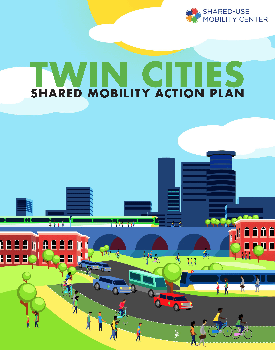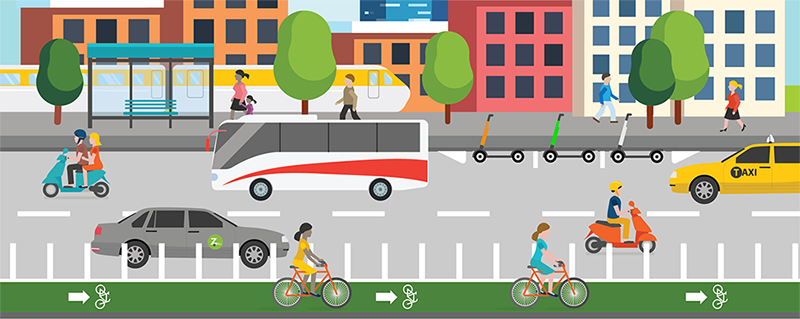Welcome to the Shared-Use Mobility Center’s weekly guide to the most impactful news, thought-provoking articles and innovative technologies that are shaping our transportation future. We believe in sharing information, just like sharing cars, bikes, and scooters, so if there’s anything additional you’d like to see, just drop us a line.
SUMC News and Announcements
SUMC In the News
Speaking out about budget cuts to Chicago transit
Chicago Mayor Lori Lightfoot’s 2021 budget proposal includes siphoning $16 million from the financially-strained Chicago Transit Authority to the city’s general budget. Smart Cities Dive covered the ‘disappointment’ expressed by local organizations including the Shared-Use Mobility Center and spoke with SUMC Founding Executive Director Sharon Feigon.
“Transportation and mobility are really fundamental to economic development…Transit service not only provides a lifeline for getting to jobs and other services that people need, it also provides jobs itself.”
Read the full article and interview here.
New, global guide for cross-sector collaboration in shared mobility
The Implementation Guide for effective public-private collaboration in Smart Mobility supports cities working with the private sector as shared mobility services are introduced. It was developed by Bax & Company, a consortium of experts from Europe and the United States including SUMC Founding Executive Director and CEO Sharon Feigon and SUMC Research and Consulting Director Colin Murphy, as well as insights from public authorities worldwide.
Take a look at this beneficial and refreshingly visual resource, which features shared mobility definitions and covers procurement and the RFP process.
See how our Twin Cities Action Plan has come to life
 Our 2017 Twin Cities Shared Mobility Action Plan recommended prioritizing integrated mobility hubs for the region along with a host of shared mobility and transit strategies. Next City recently covered how Minneapolis has taken the idea and ran with it, along with the public works department, providers, and philanthropic partners. We hope this is the beginning of a nationwide trend.
Our 2017 Twin Cities Shared Mobility Action Plan recommended prioritizing integrated mobility hubs for the region along with a host of shared mobility and transit strategies. Next City recently covered how Minneapolis has taken the idea and ran with it, along with the public works department, providers, and philanthropic partners. We hope this is the beginning of a nationwide trend.
Mobility Justice
“We have to get out of a mindset where there are only certain people who are transit-dependent…Because we are all dependent on the people who are transit-dependent. We are all transit-dependent.” The Kinder Institute features transportation justice expert Tamika L. Butler in this article on how racial inequality, urban planning, and transportation are inextricably linked.
Metrics don’t tell the whole story. A University of Texas at Austin researcher examines CapMetro’s transit restructuring project and how this does and doesn’t cover the extent of local racial discrimination and equity concerns about service changes in this post on Medium.
Read about Stephanie Gidigbi Jenkins, the National Resources Defense Council’s director of policy and partnerships for their Healthy People & Thriving Communities Program, and her history of advocating for the repair of communities divided from decades of infrastructure-based racial injustice.
Is all public space created equal? Environmental neuroscientist Robin Mazumder says they aren’t yet—but can be if designers, researchers, and policy makers look through the lens of people who have experienced the pervasiveness of racism to coalesce inclusive and intersectional solutions that address it.
Ridehailing/Carsharing/Carpooling
Uber has officially sold its autonomous vehicles unit Advanced Technologies Group to startup Aurora Innovation, valued at a near $4 billion, with CEO Dara Khosrowshahi joining Aurora’s board and Uber pumping a cool $400 million into the company.
The top court in the European Union has ruled that ridehailing companies are considered online platforms—not taxi companies—which nets a positive win for mobility providers like Uber, Free Now, and Bolt if they can continue to prove their business model is far from the traditional taxicab.
Going against recent trends in carshare decline in Seattle, AAA’s GIG Car Share service is growing in the Emerald City with 120 more Toyota Prius cars and expanding the network to 23 square miles.
The Drivers Cooperative, a new ridehailing app that plans to launch in New York in 2021, aims to do the seemingly impossible: give drivers higher per-trip payments, channel the app’s profits into driver services and benefits, and give riders a cheaper trip.
Bikesharing and Micromobility
Metros like Portland, OR and Madison, WI are using electric cargo bikes to help decongest streets and enable cleaner transportation in city services in a bid to reduce their reliance on single-occupancy cars and light-duty trucks.
Data privacy is a right, but data sharing is crucial so that city planners, researchers, and advocates can work together on creating informed policy for safer, multimodal streets. Read about one possible de-identification solution.
The NY-based micromobility company Hellbiz has acquired scooter operator Skip and has sights set to expand the latter’s brand through a global strategy by partnering with various cities to “promote transportation equity.”
Bird has announced a new autonomous emergency braking system for its scooters—a first for the industry—that will slowly engage the brakes if any type of failure or anomaly is detected in the mechanical braking system.
Transit
“The profound cuts agencies are contemplating could hobble the recoveries of major cities from New York to Los Angeles and San Francisco, where reliable transit is a lifeblood of the local economies.” Read about major service cuts that loom over every major transit agency in the US—and what’s being done to save them—in the New York Times.
Streetsblog dives into a recent TransitCenter panel on the new bus lanes that have sprung up due to the pandemic in major US cities, pointing out that they have resulted in calmer car speeds and increased bus travel times, but need to expand and address equity and other issues to truly be effective.
With public transportation strapped in our pandemic times, how can we work to create resilient and sustainable transit networks that account for public health while staying nimble enough to evolve with past the 9-5 commute? (Hint: investment.)
If New York wants to hit that “zero emissions bus fleet by 2040”, city officials, utility companies, and EV providers will need to kick transit electrification into overdrive to make it a reality according to a new report from public transportation sustainability and equity coalition ElectrifyNY.
Technology
Pennsylvania has moved to make self-driving delivery robots, which can weigh up to 550 lbs, legal on state sidewalks in urban and suburban areas—and has legally classified them as “pedestrians”. This is a dangerous policy that will make sidewalks unsafe for actual pedestrians, especially those with any sort of mobility impairment.
The town of Braintree, Essex now has the UK’s first all-electric car charging station that can juice up to 36 cars at once. Where will this station get its energy, you ask? From a subsidy-free solar farm, of course!
Electric vehicle company Aptera has unveiled its latest car—a plane fuselage-shaped EV that is outfitted with solar panels and an aerodynamic design which the company claims creates a vehicle that you will never have to charge. Available now.
Read how one Arizona State student has maneuvered the streets of Phoenix-suburb Chandler, AZ through 60 autonomous rides in Waymo’s driverless taxis and his experience with safety, convenience, and what his family or friends thought of the trips on Ars Technica.
Sustainability
Check out Transportation for America’s five principles to inform the development of any universal curbside language and set of standards, intended to keep public interest at the core while creating flexible curb management practices to fit community needs.
The Local Leader’s Toolkit, developed by civic development advocacy nonprofit Strong Towns, provides a resource to enrich community-centric growth and fortification in cities by making small-but-powerful changes. Watch the web discussion about the toolkit and read some key actions on The Alternative UK.
Nissan, following in the footsteps of GM, has joined the automaker in leaving the coalition that supported the Trump administration’s efforts to overturn emissions-cutting vehicle standards in California, creating a move that helps the state in its fight against pollution and climate change.
What we do to make local economies more robust? The movement to allow accessory commercial units (or ACUs for short) in our neighborhoods and metros could do just that by giving budding entrepreneurs more flexibility with small businesses for more vibrant, walkable, and commercially-connected blocks.
Requests for Proposals, Inquiries, and Information
The SUMC team is growing in exciting new directions! Read about two new Program Associate and Coordinator positions and a third Program Manager position on our careers page.
RFI: Bikeshare in Ithaca
The Center for Community Transportation
Ithaca, NY
Deadline: December 18, 2020
RFP: Microtransit Technology Services
Virginia Department of Rail & Public Transportation
Gloucester County and Town of Wise, VA
Deadline: December 31, 2020
RFSOQ: Las Vegas Medical District Automated Circulator and Connected Pedestrian Safety Program
Regional Transportation Commission of Southern Nevada (RTC)
Las Vegas, NV
Deadline: January 5, 2021
Notice of Intent: Accelerating Clean Transportation Now Program
Massachusetts Clean Energy Center (MassCEC)
Boston, MA
RFP Release: January 8, 2021
Open Call: Climate Smart Cities Challenge
Nesta
London, GB
Deadline: January 22, 2021
Did someone forward this to you? Sign up for our newsletter here.




